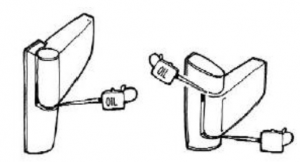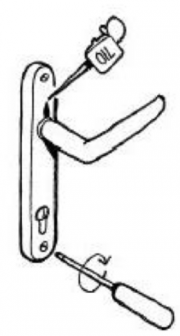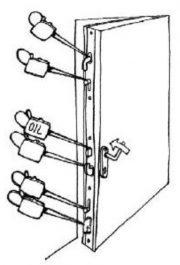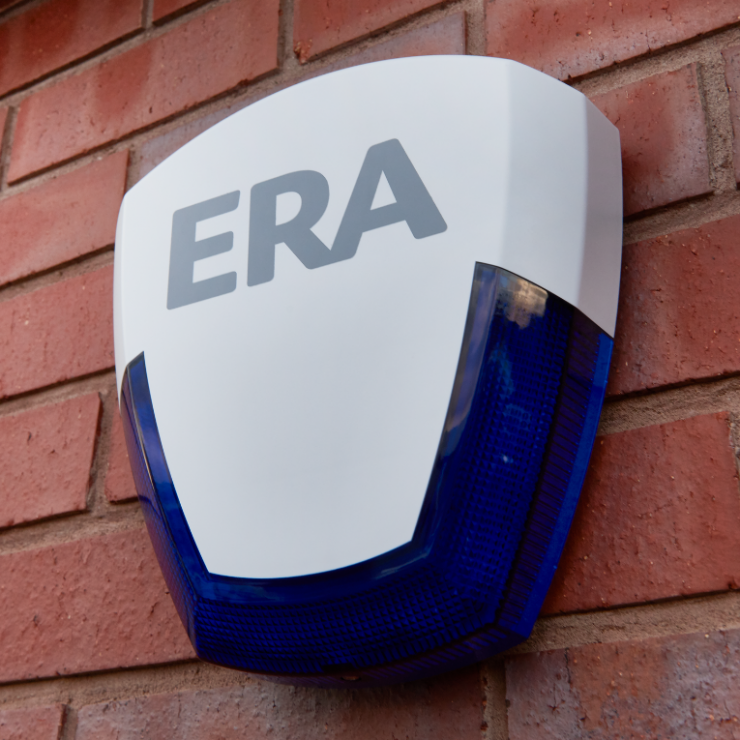General
For PVCu doors periodically, wipe the frame and sill with warm water and a mild detergent to remove any surface grime. Difficult stains may be removed using a gentle cream cleaner.
For composite doors maintenance is normally minimal but the surface should be periodically wiped with a soft cloth to remove any dirt. For timber or aluminium doors please refer to the care instructions from your installer. Glass should be cleaned using a branded glass cleaner.
Hinges
The product should be lightly lubricated using a light nonacidic mineral oil (e.g. “3 in 1”) twice per year and the surface cleaned with a soft damp cloth.
The product should be periodically adjusted and the fixings tightened to ensure a satisfactory operation.
Handles
By virtue of their use most handles are checked frequently, but be sure to check handles on doors that aren’t used as frequently – make sure that the handle returns to the horizontal position.
For continued protection of the quality finish and appearance, we advise routine cleaning of all external hardware. We recommend wiping it with a clean cloth soaked in warm water and mild detergent every month and cleaned with a soft damp cloth to remove any dust or grime, taking care not to scratch the surface. Please refrain from using abrasive cleaners, aerosol sprays or heavy-duty cleaners, containing Chlorine or Potassium as this may affect the surface finish of the handle. This procedure is particularly essential if products are used within a 25-mile radius of coastal areas or close proximity to building sites or large industrial areas, where more frequent cleaning may be required to prevent the accumulation of corrosive contaminants.
Moving parts should also be lightly lubricated using a light non-acidic mineral oil (e.g., “3 in 1”) at least twice per year. Check all fixings of the handle and tighten if necessary. The product may need to be adjusted and fixings tightened to ensure a satisfactory operation.
Locks
All exposed moving parts should be lightly lubricated using a light non-acidic mineral oil (e.g. “3 in 1”) twice per year and the surface cleaned with a soft damp cloth.
The product may need to be adjusted and fixings tightened to ensure a satisfactory operation.
Letterplates, Knockers and Numerals
For continued protection of the quality finish and appearance, we advise routine cleaning of all external hardware. We recommend wiping it with a clean cloth soaked in warm water and mild detergent every month and cleaned with a soft damp cloth to remove any dust or grime, taking care not to scratch the surface. Please refrain from using abrasive cleaners, aerosol sprays or heavy-duty cleaners, containing Chlorine or Potassium as this may affect the surface finish of the handle. This procedure is particularly essential if products are used within a 25-mile radius of coastal areas or close proximity to building sites or large industrial areas, where more frequent cleaning may be required to prevent the accumulation of corrosive contaminants.
Moving parts should also be lightly lubricated using a light non-acidic mineral oil (e.g., “3 in 1”) at least twice per year. Check all fixings of the handle and tighten if necessary. The product may need to be adjusted and fixings tightened to ensure a satisfactory operation.
For stainless steel furniture we recommend that all exposed stainless steel surfaces should be wiped over with a clean cloth and warm water with a mild detergent on a frequent and routine basis. For more stubborn dirt or stains use mild, non-scratching abrasive powders such as typical household cleaners. These can be used with warm water, bristle brushes, sponges or clean cloths. For more aggressive cleaning a small amount of vinegar can be added to the powder. Carbon steel brushes and steel wool should be avoided as they may leave particles embedded in the surface, which can lead to rusting. Cleaning should always be immediately followed by rinsing in clean hot water and the surface then wiped completely with a dry towel. To maintain your stainless steel product in the best condition, we recommend routine cleaning once a month and more often in areas subject to heavy soiling or frequent use.





